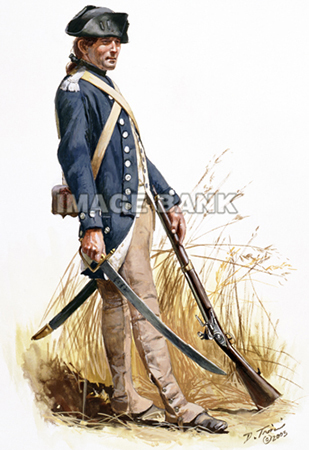 © Don Troiani Sergeant, Clark's Illinois Regiment, 1782 | A Brief Profile of the Continental Army© 1999 -- 2021 - John K. Robertson and Bob McDonald THE ARMY OF 1781 THROUGH 1782 |  © Don Troiani Sergeant, Continental Line, 1780-81 |
|
As the Fall of 1780 approached, the challenge of raising a new establishment reemerged. Excepting only the “for the war” men and a minimal number of short-term recruits, the large proportion of the army that had mustered for three years in 1777 was nearing its discharge date. In addition to the old problem of disbanding one army and raising another, a further critical handicap faced Washington in 1780. In March of that year, the Congress had passed a resolution to redeem the old Continental paper currency at a rate of 40-to-1 in hard currency, had thus totally undermined the economy of the government, and then promptly retired from issuing paper currency altogether, abdicating even this power to the states. In short, the Congress was bankrupt. Resultantly and predictably, officers sent home to recruit for the new army of 1781 found it remarkably difficult to meet their manpower quotas. As one state competed with another for recruits, bounty payments soared, reaching $500 or more. With the pool of able and willing recruits ever shrinking, it became quite clear that the “highest bidder” approach to recruitment would be in full force. Concurrently, haunted by its tremendous debts and stymied by a war now more than five years old, the Congress began to slash the military budget and reduce the size of the army. Whereas previously responsible for fifteen battalions under the 1777 establishment, Massachusetts’ quota for 1781 would be lowered to ten regiments. Likewise, Connecticut’s quota was reduced from eight battalions to only five regiments. Even tiny Rhode Island was affected, its two battalions of 1777 now being consolidated to a single regiment. The winter of 1780-81, climatically the fiercest of the century, brought yet one more serious burden to the commander-in-chief — to do more with less. As the critical year of the Yorktown Campaign opened, the army was in perhaps the most neglected condition it had ever been. With the dawning of the new year, it finally snapped back. January 1, 1781, brought the mutiny of the entire Pennsylvania Line at its winter huts near Morristown, while the Highlands garrison suffered smaller but nonetheless frightening mutinies among several New England brigades. By mid-month, the Pennsylvania authorities had negotiated a settlement with the mutineers, the result being the discharge of the majority of the state’s veterans, even including a substantial number of “for the war” men. The Pennsylvania Line would never recover its prior status. Only several weeks later, a substantial portion of the New Jersey Line mutinied near Pompton, New Jersey. On this occasion, Washington neither delayed nor hesitated; negotiation was unacceptable. A force of New England troops from the Highlands garrison was driven via forced march through a snowstorm, surrounded the Jersey mutineers’ huts at dawn, and deployed in line of battle. Within minutes, three sergeant ringleaders were identified, subjected to an immediate court-martial, and condemned. With firing squads drafted from fellow mutineers, two of the main offenders were executed, the blood on the snow symbolizing the depth of morale and spirit brought about by up to a year of non-payment of wages, poor quality and intermittent supplies of food, and shoddy or completely non-delivered clothing allotments. Through minimal civilian support for a seemingly endless war, lack of cooperation from literally competing states, and through the impotence of a Congress with complete responsibility and virtually no powers, the American cause was on a path of self-destruction. Given such a bleak beginning, it is nearly incomprehensible that 1781 would become the year of critical and supreme field victory. The actual alignment of variables and sequence of events would strain belief if posed as fiction. From Cornwallis’ decision to garrison the Yorktown peninsula, to the flawless convergence of the French army from its Rhode Island base with Washington’s Continentals at Peekskill and their coordinated march from New York to Virginia, to the narrow-window availability of the French fleet to blockade Yorktown from any possible sea-based support or rescue, the campaign played out with nearly unheard of textbook precision and unsurpassable success. Only eight months separated the death of two New Jersey sergeants in the snow of Pompton and the grounding of arms and colors of the entire British southern army to a composite allied siege force that sealed the fate of the war. Rarely in the history of warfare and world-shaping events have such an inauspicious beginning yielded such a remarkable result. Beyond the initial euphoria, Washington foresaw the danger. He repeatedly warned of it, but yet it came. Returning from Virginia, the commander spent the entire winter of 1781-82 in Philadelphia advising and entreating the Congress to maintain full support and, in fact, expansion of the army, the single time during the war he was absent from field headquarters for more than a few days. He had foreseen the expected but foolhardy relaxation of effort and vigilance that the Yorktown victory would engender. In that ironic manner, the war’s most strategically important field victory led to a period of severe danger of another kind. As usual, it focused on money and power. It would be difficult to overstate the depths to which support for the war had fallen among the civilian populace and their elected state governments prior to Yorktown. As early as April 1780, a Massachusetts artillery officer traveling through New England on his return to camp from furlough recorded attending divine services at a Mr. Brooks’ meeting house:
These weren’t the animosities of the Tory sector of the population; they were the frustrations of a populace living through rampant inflation, uncontrolled profiteering, and severely disrupted familial relationships. What Washington had foreseen was the leap to the conviction of complete victory and the war’s conclusion that Yorktown would immediately bring about. Desire would create the delusion of reality. In truth, though, the military situation in the north was precisely what it had been for more than a year before Cornwallis’ surrender. Sir Henry Clinton’s garrison of 15,000 British regulars, German allies, and Loyalist troops continued its chokehold on New York and the surrounding territory and continued to possess a potentially overwhelming capacity for immediate naval attack at will ranging anywhere from Rhode Island to the Delaware Capes. From this time period and based on this differentiation of perceptions, the army and the civilian sector, inclusive of its state and central governments, became increasingly separated and adversarial. The great divisor was money. In an age of distinct social stratification, it was pragmatically inevitable that the army would become a differentiated class. Most pointedly, given that that society placed strong emphasis on the stratum of “gentlemen” who were independent of the need for personal labor for economic stability, it would, in particular, be the officer corps upon which the greatest focus of contention would fall. As early as 1776, Congressman John Adams wrote disgustedly of the army’s officers, comparing their desire for rank, recognition, and reward to “apes scrambling for nuts.” Many young men who, in their prior civilian lives, had been artisans, craftsmen, or even skilled laborers suddenly had become, concurrently, both commissioned officers and “gentlemen.” In the perspectives of the time, and following English tradition, the two were synonymous. An army officer, by definition, was a gentleman. Also in line with English tradition, though, society and the individual himself had certain expectations of a gentleman. As noted, a gentleman would not need to pursue labor as the basis for financial well-being. In the sense of a modern corporate officer, he might be a gentleman farmer, but his role was that of “the CEO” of an agricultural firm. Expectations could be so stringent that even highly successful and wealthy merchants or “money men” had something of a taint on their gentlemanly position. In contrast to such shortfalls, the ideal social role of a gentleman was statesmanship (a.k.a., “politician.”) Balancing these contributions made to his society, a gentleman could expect certain special benefits and emoluments. These “perks”, such as appointment to office and pensions, were one of the most resented and mistrusted characteristics of a standing army in the revolutionary American mindset. An empire founded in virtue had no room for placemen. As early as the winter of 1777, a strong and assertive campaign had been well underway to secure post-war pensions for the officer corps of the Continental Army. This single issue became and remained a major basis for vigorous and heated debate for at least six years, reaching its peak during 1782 and 1783. Thus, during the final two years of its existence, the virtual absence of active campaigning and the increased emphasis on “dividing the spoils” of post-war America notably shifted the perspectives of the army from an external military focus to a far more internal political one. It has been noted that every sociopolitical revolution other than America’s has turned upon and destroyed itself from within. It was exactly this central issue that would be at the core of the Continental Army during its final two years. The unfair advantage of hindsight demonstrates that, while not paranoid, many of General Washington’s post-Yorktown military concerns were significantly exaggerated. Excepting for the intermittent skirmishing within “the middle ground” along the Croton River lines, first Sir Henry Clinton, then his replacement, Sir Guy Carleton, had no strong desire to repeat the purposeless occupation of the Hudson Highlands approaches to West Point that had consumed the campaign season of 1779. Further, first unofficial than fully validated communication from London began to point toward the final, yet intensely grudging, acceptance that the war “in the colonies” had become an enormously expensive lost cause. Through the United State’s securing French, Spanish, and Dutch allies, Great Britain was now consumed by a near-global war. The effect of this respite for the Continentals is recorded in many of their letters and diaries, the primary theme being brooding animosity toward the populace and governments for which they had delivered and virtually sealed national independence. As the army shrunk following the reorganization of 1781, with entire regiments being dissolved, many an officer found himself categorized as “supernumerary”, a convoluted phrasing for “a now unnecessary fifth wheel.” Concurrently, despite five years of pressure by Washington and the officer corps, with equally consistent tabling and avoidance of the issue by Congress, post-war pensions remained a sputtering fuse. That spark intensified as 1782 wore away, with actions being initiated late in the year that would bring about a most extraordinary conclusion the following Spring. |
SYNOPSIS
INTRODUCTION
STRUCTURE & COMPONENTS
THE SUCCESSIVE "ESTABLISHMENTS"
THE ARMY OF 1775
THE ARMY OF 1776
THE ARMY OF 1777 THROUGH 1780
THE ARMY OF 1781 THROUGH 1782 [This page]
THE ARMIES OF 1783 AND 1784
THE NEWBURGH CONSPIRACY
M&R NUMBERS

|

|

|